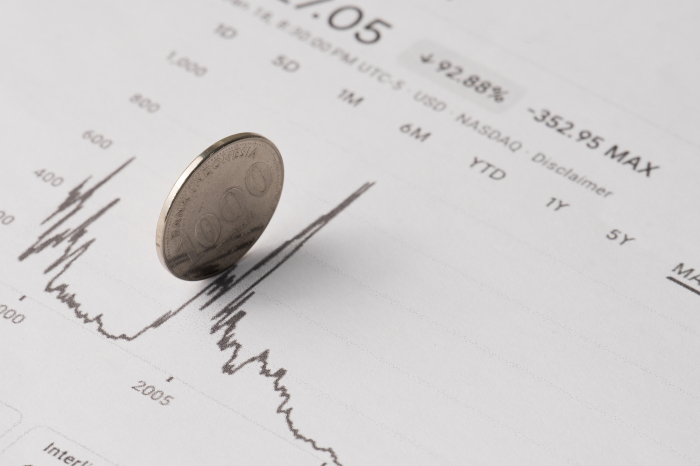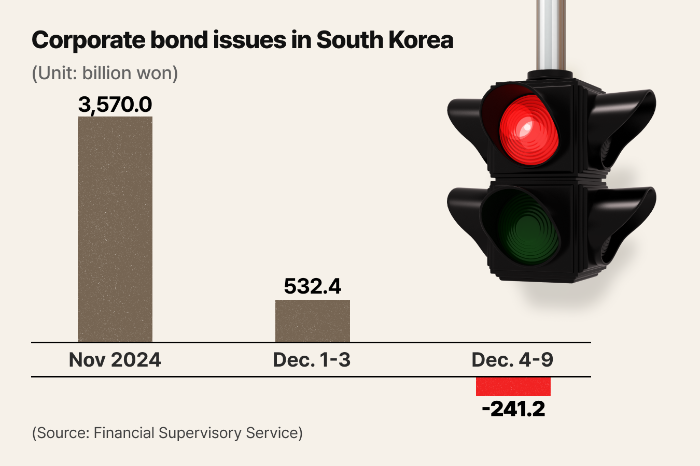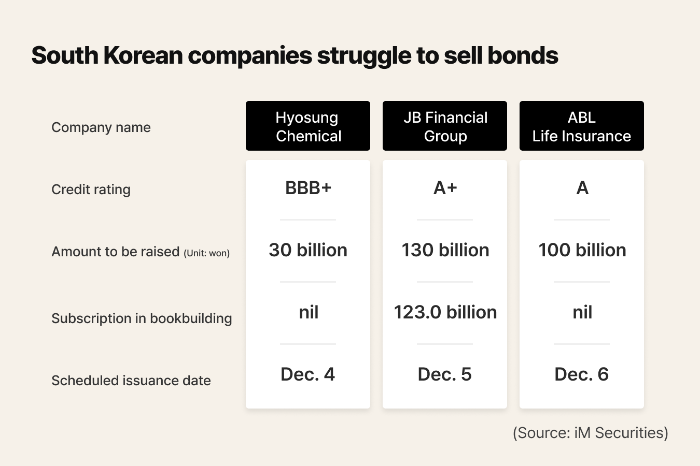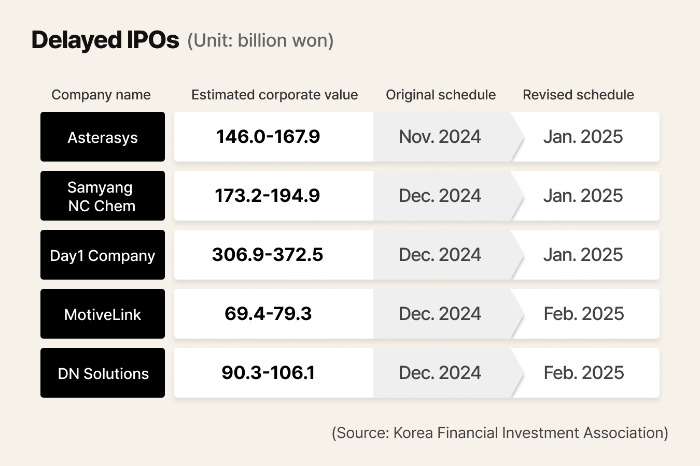Korean firms halt bond, share issues despite tighter liquidity
Some foreign funds are preparing to flee the domestic bond market, says one brokerage firm's debt capital market head
By Dec 11, 2024 (Gmt+09:00)
LG Chem to sell water filter business to Glenwood PE for $692 million


KT&G eyes overseas M&A after rejecting activist fund's offer


Kyobo Life poised to buy Japan’s SBI Group-owned savings bank


StockX in merger talks with Naver’s online reseller Kream


Meritz backs half of ex-manager’s $210 mn hedge fund



South Korean companies are postponing bond issues and initial public offerings on chilled investor sentiment in the aftermath of President Yoon Suk Yeol’s failed martial law attempt last week.
In desperate efforts to raise money, they offered much higher interest rates and suggested lower valuations. But even so, they failed to whet investor appetite, derailing their plans to secure more cash to brace for an economic downturn.
For most of this year, the domestic bond market enjoyed abundant liquidity as investors sought to lock in high yields before the arrival of widely expected interest rate cuts next year.
But the tide turned with Yoon’s martial law imposition on the night of Dec. 3. While repealed by Parliament a few hours later, it has raised political uncertainty about Asia’s No. 4 economy.

From Dec. 4-9, South Korean companies redeemed a net 241.2 billion won ($168 million) in bonds, according to the Korea Financial Investment Association. That means more debt repayment than new issues.
The figure compared with their debt sales of net 3.1 trillion won in the entire month of October and net 3.6 trillion won in November.
A large domestic construction company is said to have sold a three-month paper at an annualized yield of 7% early this week. That is even higher than the mid-4% yield at which it issued a three-month note in late October.

ABL Life Insurance Co. recently scrapped a plan to raise 100 billion won in 10-year subordinated debt rated single A.
Hyosung Chemical Corp. also withdrew a 30-billion-won bond sale at an annualized yield of 7.7%. The one-year bond was rated triple A.
No investors subscribed for the issues during bookbuilding, said industry officials.
“Until last month, there was a strong demand for high-interest-rate, non-investment grade corporate bonds. But the atmosphere has reversed,” said Kim Myung-sil, a researcher at iM Securities.
“Investors are shifting to treasuries and blue-chip corporate bonds in search of safe-haven assets,” he added.
Some institutional investors are said to be steering clear of bonds issued by chemical, petrochemical chemical and construction companies, which are suffering a prolonged industry slump. Also, some foreign funds are preparing to flee the domestic bond market, said a debt capital market head at a local brokerage firm.

Amid the country’s political leadership vacuum, five Korean companies, including machine tool maker DN Solutions Co., have recently postponed their stock market listings to next year.
Still, it remains uncertain when they will revisit their IPO plans with the benchmark stock index hovering around its lowest point in more than 11 months.
On Monday, the benchmark Kospi index broke below the 2,400 level for the first time since Jan. 20, 2023
Write to Hyeong-Gyo Suh, Ik-hwan Kim and Seok-Cheol Choi at seogyo@hankyung.com
Yeonhee Kim edited this article.
-
 EconomyOpposition-controlled Korean Parliament passes slashed $470 bn budget
EconomyOpposition-controlled Korean Parliament passes slashed $470 bn budgetDec 10, 2024 (Gmt+09:00)
2 Min read -

-

-
 Mergers & AcquisitionsLX Pantos IPO delayed as Mirae Asset sells stake
Mergers & AcquisitionsLX Pantos IPO delayed as Mirae Asset sells stakeDec 09, 2024 (Gmt+09:00)
1 Min read -
 IPOsSono International seeks IPO in 2025 with $2.1 billion in corporate value
IPOsSono International seeks IPO in 2025 with $2.1 billion in corporate valueDec 05, 2024 (Gmt+09:00)
3 Min read -
 Corporate bondsTriple-A rated SK Telecom, KT tap 10-year bond market
Corporate bondsTriple-A rated SK Telecom, KT tap 10-year bond marketNov 26, 2024 (Gmt+09:00)
1 Min read -
 Capital raisingS.Korean firms’ rights issues poised for 12-year low
Capital raisingS.Korean firms’ rights issues poised for 12-year lowNov 17, 2024 (Gmt+09:00)
2 Min read -
 IPOsSouth Korea’s Viva Republica drops Korean IPO plan, seeks US debut
IPOsSouth Korea’s Viva Republica drops Korean IPO plan, seeks US debutOct 29, 2024 (Gmt+09:00)
2 Min read -
 IPOsKorea’s LG CNS, DN Solutions seek billions of dollars via Jan IPOs
IPOsKorea’s LG CNS, DN Solutions seek billions of dollars via Jan IPOsOct 27, 2024 (Gmt+09:00)
2 Min read -
 Debt financingKorean firms rush to sell bonds with yields at over 2-yr low
Debt financingKorean firms rush to sell bonds with yields at over 2-yr lowAug 08, 2024 (Gmt+09:00)
3 Min read -
 Corporate bondsKorean firms' bond sales hit record in Q1 amid rate cut signal
Corporate bondsKorean firms' bond sales hit record in Q1 amid rate cut signalApr 05, 2024 (Gmt+09:00)
2 Min read -
 Corporate bondsKorean firms’ monthly net debt sales hit record high in January
Corporate bondsKorean firms’ monthly net debt sales hit record high in JanuaryFeb 02, 2024 (Gmt+09:00)
3 Min read


